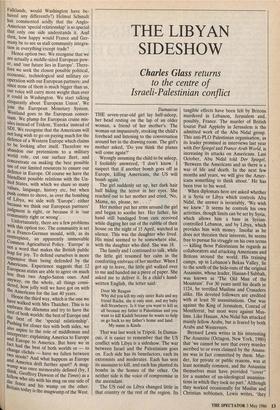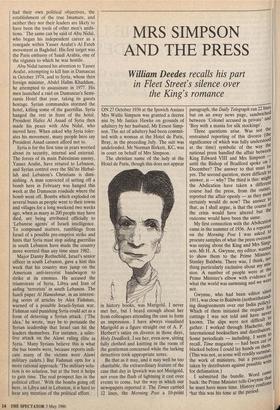THE LIBYAN SIDESHOW
Charles Glass returns
to the centre of Israeli-Palestinian conflict
Damascus THE seven-year-old girl lay half-asleep, her head resting on the lap of an older woman, a friend of her mother's. The woman sat impassively, stroking the child's forehead and listening to the conversation around her in the drawing room. The girl's mother asked, 'Do you think the planes will come again?'
Wrongly assuming the child to be asleep, I foolishly answered, 'I don't know. I suspect that if another bomb goes off in Europe, killing Americans, the US will bomb again.'
The girl suddenly sat up, her dark hair half hiding the terror in her eyes. She reached out to her mother and cried, 'No, Mama, no, please, no . . . Her mother put her arms around the girl and began to soothe her. Her father, his hand still bandaged from cuts received while digging her out of the rubble of their house on the night of 15 April, watched in silence. This was the daughter who lived. His mind seemed to be somewhere else, with the daughter who died. She was 18. The family and I continued to talk, while the little girl resumed her calm in the comforting embrace of her mother. When I got up to leave, the little girl walked over to me and handed me a piece of paper. She asked me to deliver it. In a child's hand- written English, the letter said:
Dear Mr Reagan Why did you kill my only sister Rafa and my friend Racha, she is only nine, and my baby doll Strawberry. Is it true you want to kill us all because my father is Palestinian and you want to kill Kadafi because he wants to help us go back to my father's home and land.
My name is Kinda
That was last week in Tripoli. In Damas- cus, it is easier to remember that the US conflict with Libya is a sideshow. The war between Israel and the Palestinians goes on. Each side has its benefactors, each its extremists and moderates. Each has sent its assassins to kill, and each has planted its bombs in the homes of the other. On neither side is the voice of compromise in the ascendant.
The US raid on Libya changed little in that country or the rest of the region. Its tangible effects have been felt by Britons murdered in Lebanon, Jerusalem and, possibly, France. The murder of British tourist Paul Appleby in Jerusalem is the admitted work of the Abu Nidal group. This anti-PLO Palestinian organisation, as its leader promised in interviews last year with Der Spiegel and France Arab World, is increasing its attacks on Americans. Last October, Abu Nidal told Der Spiegel, 'Between the Americans and us there is a war of life and death. In the next few months and years, we will give the Amer- icans something to think about.' He has been true to his word.
When diplomats here are asked whether it is Syria or Libya which controls Abu Nidal, the answer is invariably, 'We wish we knew.' It seems he controls his own activities, though limits can be set by Syria, which allows him a base in Syrian- controlled Lebanon, and by Libya, which provides him with money. Insofar as he does not threaten their interests, he seems free to pursue his struggle on his own terms — killing those Palestinians he regards as collaborators and attacking Americans and Britons around the world. His training camps, up in Lebanon's Bekaa Valley, lie to the south of the hide-outs of the original Assassins, whose leader, Hassan-I Sabbah, was known as 'The Old Man of the Mountain'. For 30 years until his death in 1124, he terrified Muslims and Crusaders alike. His devoted followers are credited with at least 50 assassinations. One was against the King of Jerusalem, Conrad of Montferrat, but most were against Mus- lims. Like Hassan, Abu Nidal has attacked mainly fellow Arabs, but is feared by both Arabs and Westerners.
Bernard Lewis writes in his interesting The Assassins (Octagon, New York, 1980) that 'we cannot be sure that every murder ascribed to or even claimed by the Assass- ins was in fact committed by them. Mur- der, for private or public reasons, was at least normally common, and the Assassins themselves must have provided "cover" for a number of un-ideological assassina- tions in which they took no part.' Although they worked occasionally for Muslim and Christian noblemen, Lewis writes, 'they
had their own political objectives, the establishment of the true Imamate, and neither they nor their leaders are likely to have been the tools of other men's ambi- tions.' The same can be said of Abu Nidal, who began his independent career as a renegade within Yasser Arafat's Al Fateh movement in Baghdad. His first target was the Paris embassy of Saudi Arabia, one of the regimes to which he was hostile.
Abu Nidal turned his attention to Yasser Arafat, attempting to kill him in Damascus in October 1974, and to Syria, whose then foreign minister, Abdel Halim Khaddam, he attempted to assassinate in 1977. His men launched a raid on Damascus's Semi- ramis Hotel that year, taking its guests hostage. Syrian commandos stormed the hotel, killing some of the guerrillas. Syria hanged the rest in front of the hotel. President Hafez Al Assad of Syria then made his peace with Abu Nidal, who moved here. When asked why Syria toler- ates his movement, many people here say President Assad cannot afford not to.
Syria is for the first time in years worried about its security, internal and external. The forces of its main Palestinian enemy, Yasser Arafat, have retured to Lebanon, and Syrian control over the Shi'ite Hizbal- lah and Lebanon's Christians is dimi- nishing. A man convicted of setting off a bomb here in February was hanged this week at the Damascus roadside where the bomb went off. Bombs which exploded on several buses as people went to their towns and villages for a long weekend two weeks ago, when as many as 200 people may have died, are being attributed officially to 'Lebanese agents' of Israeli intelligence. To compound matters, rumblings from Israel of a possible pre-emptive strike and hints that Syria must stop aiding guerrillas in south Lebanon have made the country more worried than any time since 1982.
Major Danny Rothschild, Israel's senior officer in south Lebanon, gave a hint this week that his country may jump on the American anti-terrorist bandwagon to strike at its enemies. He accused the triumvirate of Syria, Libya and Iran of aiding 'terrorists' in south Lebanon. The Isaeli paper Al Hamishmar, in an interest- ing series of articles by Alex Fishman, warned of a possible Israeli-Syrian war. Fishman said punishing Syria could act as a form of deterring a Syrian attack. (The idea,' he wrote, 'may be to persuade the Syrian leadership that Israel can hit the leaders themselves. For instance, a selec- tive attack on the Alawi ruling elite in Syria.' Many Syrians believe this is what the bus bombs were, because reports indi- cate many of the victims were Alawi military cadets.) But Fishman opts for a more rational approach: 'The military solu- tion is no solution, but at the best it helps to gain time. The real prospect lies in the political effort.' With the bombs going off here, in Libya and in Lebanon, it is hard to hear any mention of the political effort.



















































 Previous page
Previous page